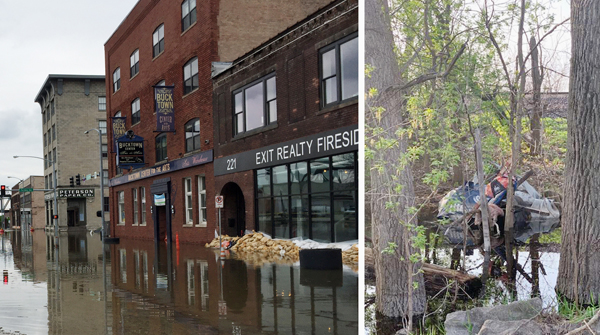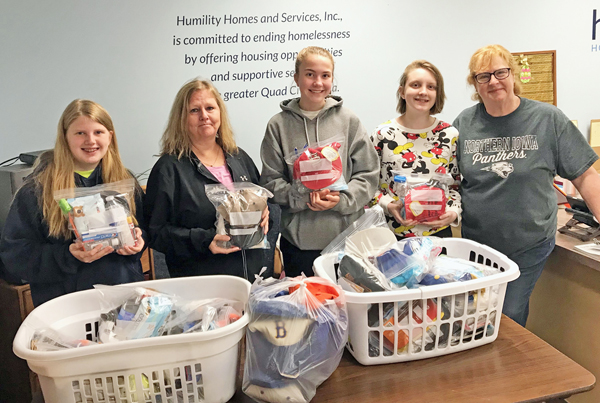
Flooding along the Mississippi River not only affected businesses and residents in Davenport, but the homeless as well. In the picture on the right, flood waters surround tents being used as shelter.
By Lindsay Steele
The Catholic Messenger
When river water rushed into apartments and businesses in downtown Davenport after a temporary flood wall failed April 30, it made national news. As the Mississippi River rose to a record crest, many of the affected individuals found themselves the source of media attention as people were eager to hear their stories and learn how they could help.
But “invisible” victims were also impacted — persons living out of sight in encampments near the river. They, too, were displaced and lost belongings. “I was at a tent site recently. There were three tents and all around them was standing water,” said Michael Gayman, Humility Homes and Services (HHS) coordinator and Catholic Worker volunteer. Elsewhere, a camper was underwater.
“When talking about members of the community (who were affected), let’s talk about everybody,” said John De Taeye, the development director for HHS. He noted that the number of people seeking services from HHS has increased since winter because “so many people rely on camping along the river,” De Taeye said. “We have about 20 adult folks that we don’t usually have.”
A lingering issue
Homeless individuals won’t be out of the water once the “Mighty” Mississippi recedes. Encampment areas may remain wet, muddy and uninhabitable for quite some time, HHS employees said. If the tents, campers or cars they were using as shelter were washed away or destroyed, these individuals won’t have a “home” to go back to.
Currently, displaced homeless individuals are able to find shelter at locations in Davenport designated to help all persons displaced by flooding but these options won’t be available long-term. “Where are they going to go when we’re full?” De Taeye asked.
Summer, in general, can be a challenging time for persons experiencing homelessness as they tackle issues like dehydration, sun exposure and exhaustion. They often walk between social service locations and may be living primarily outdoors where they are exposed to the elements, Gayman said. “A lot of our folks tend to be very mobile.” Because of the flooding, it’s likely that the mosquito and tick populations will be higher than normal, leading to additional discomfort and health risks.

St. Mary Parish–Wilton youth group members Emily Fagner, Lynette Fagner, Issy De Long and Kendal Brase, and religious educator Jean Semsch, show off summer survival kits they made for Humility Homes and Services in Davenport.
Helping out
HHS accepts donations of summer survival items such as water bottles, sunscreen, insect repellant, snacks, socks and hygiene items for persons in need. HHS distributes these items at their day shelter. Gayman regularly carries items like these in a backpack while bicycling downtown and participating in homeless outreach. Individuals experiencing homelessness prefer loose, travel-size items because they tend to carry their possessions, he said. As the number of homeless individuals seeking services is likely to remain high in the summer months, the need for these items remains high, HHS staff said.
Recently, teenagers from St. Mary Parish in Wilton made summer survival kits for HHS. “Patti (Trapp, volunteer coordinator for HHS) gave me ideas for what to put in them,” said Jean Semsch, a religious educator. “I also consulted a friend who used to be homeless to see if there was anything else we should place in the kit.”
The kits also contained a personalized note from the youths. De Taeye believes the personalized notes from the students will be meaningful to the individuals who receive the kits. “That human connection means so much.” Gayman added, “It’s just a reassurance that someone cares about them. We all crave that.”
Long term solutions
Helping to meet the immediate needs of persons who are experiencing homelessness is important, but HHS and other community organizations would like to find long-term solutions to homelessness.
Lack of affordable housing in Davenport continues to be a problem, De Taeye said. A 2015 city housing assessment determined that Davenport lacks 2,623 affordable units for renters with an annual income of $13,445 or less. The study considers rent at or below 30 percent of a tenant’s income to be affordable.
Lack of affordable housing forces people to either purchase or rent homes priced above what they can reasonably afford, share space with friends or family members, couch surfing, rent hotel rooms or go without a place to stay. De Taeye said this issue affects a wide variety of people, including college graduates with student loans to pay off. Creating more affordable housing opportunities would help get more people into stable living environments. It could also reduce the number of people living in encampments by the river.
De Taeye wants people to be aware of how extreme weather conditions impact the most vulnerable population. Colder temperatures lead to more health risks in winter and rising temperatures and changing rainfall patterns may lead to an increase of flooding.
Once the Mississippi flood waters recede, “people may not have encampments to go back to; the best thing for them would be to have a stable home,” De Taeye said.
Salvation Army Flood Donation/ Distribution Center Continues Operation
The Flood Relief Donation and Distribution Center will continue operations at the former Office Max location, 320 W. Kimberly Road in Davenport, through May 24. Hours of operation will continue to be 10am-6pm for those days. Cleaning supplies, bottled water, and fans will be available for pick up, while supplies last. Donations will also be accepted at the center.
Residents of Scott County Iowa and Rock Island County Illinois will be required to provide proof of residency in an area affected by the flooding, to receive items from the distribution center. That proof can be a driver’s license or state ID card, a utility bill for the affected address, or a registration number from the Federal Emergency Management Agency.
FEMA officials will, also, be on site at the former Office Max location to register Scott County residents for disaster assistance from the Federal Government. Those impacted by the floods can also register with FEMA online at: www.disasterassistance.gov.
For additional details and questions call Bill Horrell, Salvation Army Development Director at (309) 566-0350.











